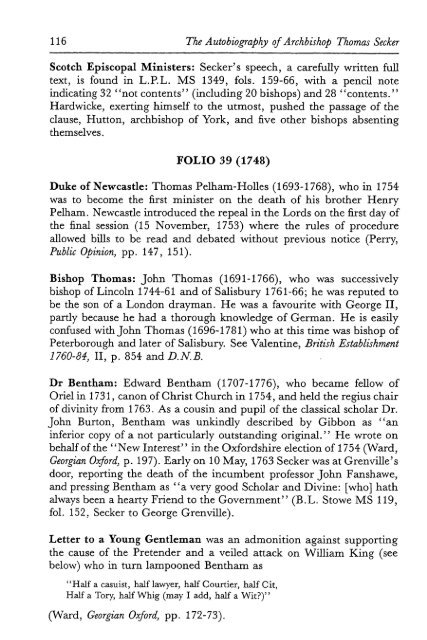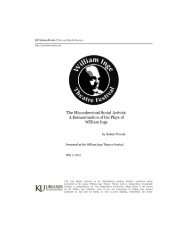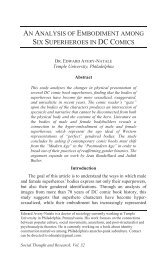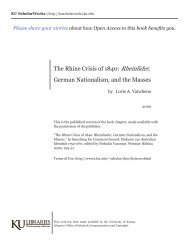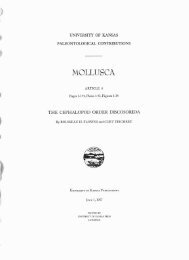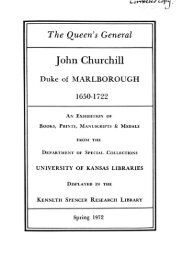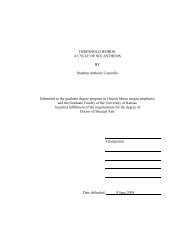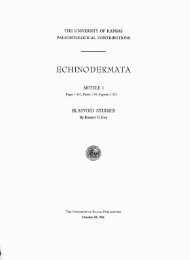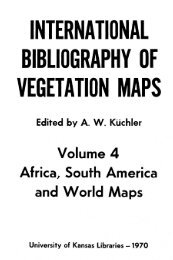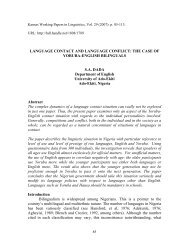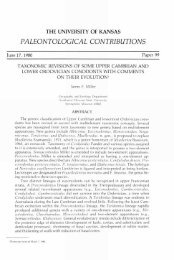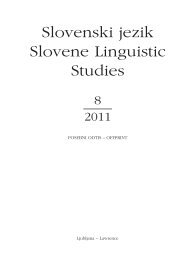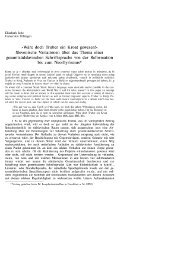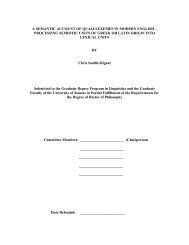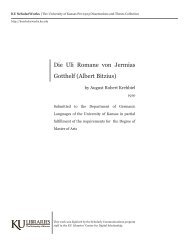Archbishop of Canterbury - KU ScholarWorks - The University of ...
Archbishop of Canterbury - KU ScholarWorks - The University of ...
Archbishop of Canterbury - KU ScholarWorks - The University of ...
You also want an ePaper? Increase the reach of your titles
YUMPU automatically turns print PDFs into web optimized ePapers that Google loves.
116 <strong>The</strong> Autobiography <strong>of</strong> <strong>Archbishop</strong> Thomas Seeker<br />
Scotch Episcopal Ministers: Seeker's speech, a carefully written full<br />
text, is found in L.P.L. MS 1349, fols. 159-66, with a pencil note<br />
indicating 32 "not contents" (including 20 bishops) and 28 "contents."<br />
Hardwicke, exerting himself to the utmost, pushed the passage <strong>of</strong> the<br />
clause, Hutton, archbishop <strong>of</strong> York, and five other bishops absenting<br />
themselves.<br />
FOLIO 39 (1748)<br />
Duke <strong>of</strong> Newcastle: Thomas Pelham-Holles (1693-1768), who in 1754<br />
was to become the first minister on the death <strong>of</strong> his brother Henry<br />
Pelham. Newcastle introduced the repeal in the Lords on the first day <strong>of</strong><br />
the final session (15 November, 1753) where the rules <strong>of</strong> procedure<br />
allowed bills to be read and debated without previous notice (Perry,<br />
Public Opinion, pp. 147, 151).<br />
Bishop Thomas: John Thomas (1691-1766), who was successively<br />
bishop <strong>of</strong> Lincoln 1744-61 and <strong>of</strong> Salisbury 1761-66; he was reputed to<br />
be the son <strong>of</strong> a London drayman. He was a favourite with George II,<br />
partly because he had a thorough knowledge <strong>of</strong> German. He is easily<br />
confused with John Thomas (1696-1781) who at this time was bishop <strong>of</strong><br />
Peterborough and later <strong>of</strong> Salisbury. See Valentine, British Establishment<br />
1760-84, II, p. 854 and D.N.B.<br />
Dr Bentham: Edward Bentham (1707-1776), who became fellow <strong>of</strong><br />
Oriel in 1731, canon <strong>of</strong> Christ Church in 1754, and held the regius chair<br />
<strong>of</strong> divinity from 1763. As a cousin and pupil <strong>of</strong> the classical scholar Dr.<br />
John Burton, Bentham was unkindly described by Gibbon as "an<br />
inferior copy <strong>of</strong> a not particularly outstanding original." He wrote on<br />
behalf <strong>of</strong> the "New Interest" in the Oxfordshire election <strong>of</strong> 1754 (Ward,<br />
Georgian Oxford, p. 197). Early on 10 May, 1763 Seeker was at Grenville's<br />
door, reporting the death <strong>of</strong> the incumbent pr<strong>of</strong>essor John Fanshawe,<br />
and pressing Bentham as "a very good Scholar and Divine: [who] hath<br />
always been a hearty Friend to the Government" (B.L. Stowe MS 119,<br />
fol. 152, Seeker to George Grenville).<br />
Letter to a Young Gentleman was an admonition against supporting<br />
the cause <strong>of</strong> the Pretender and a veiled attack on William King (see<br />
below) who in turn lampooned Bentham as<br />
"Half a casuist, half lawyer, half Courtier, half Cit,<br />
Half a Tory, half Whig (may I add, half a Wit?)"<br />
(Ward, Georgian Oxford, pp. 172-73).


